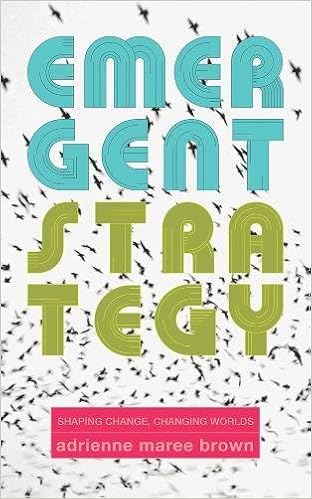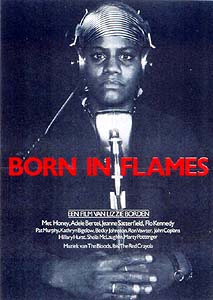A Year of Shifting Perceptions
by Julie Phillips
It’s been a year of shifting perceptions for me, in
which some things that have been stuck for a long time came loose, I can only
hope for the better. Among my favorites this year are some books and a film
about how to take useful action, whether or not you know where you’re heading.
The most encouraging book I read all year was Adrienne Maree
Brown’s Emergent Strategy, a meditation on social justice and science
fiction that is also a kind of carrier bag for ideas about imagination and change.
Emergence has to do with allowing small interactions to become linked together
in complex patterns of community and persistence. Taking inspiration from the
work of Octavia Butler, as well as from biology and chaos theory, Brown emphasizes
resilience and adaptivity as useful qualities and suggests learning from the
survival strategies of dandelions, mushrooms, and oak trees.
She also advises “collaborative ideation—what are the ideas
that liberate all of us? The more people that collaborate on that ideation, the
more that people will be served by the resulting world(s). Science fiction is
simply a way to practice the future together.” Citing Toni Cade Bambara, she says,
“We must make just and liberated futures irresistible.”
While I was reading Emergent Strategy and marching
in demos, an old friend took me to see Born in Flames, Lizzie Borden’s 1983
science fiction film about women plotting a revolution. It deals with the
potential power of small-scale direct action, and I just can’t tell you how
good this movie is and how amazing it feels to watch in this moment. Visually
and thematically, it illustrates Brown’s patterns of emergence: Gangs of women
on bicycles circulate for safer streets. Two pirate radio stations create links
between feminist cells citywide. And an older activist (played by feminist
lawyer Flo Kennedy) advises a younger one: “Which would you rather see come
through the door, one unified lion or 500 mice? You know, 500 mice can do a lot
of damage.”
The central narrative of armed revolution is not
the film’s strongest point, although a scene of the Women’s Army hijacking a
New York City TV station does have a kind of anti-Fox News satisfaction. But its
class- and race-conscious analysis of feminism is fine, and I enjoyed its ’80s
feminist anti-style (one of my responses to it was “Hey, I used to wear that”)
and terrific punk soundtrack. You can watch it on demand here: https://vimeo.com/ondemand/borninflames
The feminism of Born in Flames grows out of
patterns of verbal exchange, and so do the weird liberating qualities of The
Blazing World, the epically strange 1666 work of fiction by Margaret
Cavendish, the Duchess of Newcastle. A friend asked me to write about it, and knowing
very little about it, I expected it to be a utopia of place—its creator’s
perfect world. What I found was a utopia of process, of dialogue and
relationships. The Blazing World isn’t actually on fire, sadly, though it has
the usual buildings made of gemstones and so on. Its most remarkable property
is that many of its inhabitants are half-human, half-animal—bird-men, lice-men,
fish-men, worm-men—and the human scientist who becomes its empress persuades them
to help her research the causes of natural phenomena. Where the science of the
time placed men above women and the natural world, Cavendish advocated scientific
inquiry as interspecies collaboration.
Also in 2019 I wrote about Suzette Haden Elgin’s Native
Tongue https://4columns.org/phillips-julie/native-tongue.
I went to a great reading by my old Voice colleague Colson Whitehead,
who is very funny about growing up a nerd as well as a profound and imaginative
thinker about the use and misuse of power. I reviewed Margaret Atwood’s The
Testaments and thought about how subtly she’s always written about the
space between individual women and their roles. https://www.julie-phillips.com/wp/?p=1048
I rediscovered the wonderful film Céline et Julie vont en bateau (1974)
by Jacques Rivette, a fantasy in which three female characters stage a
jailbreak from a heterosexist love story and go off in search of a better plot.
I was sad that we lost Vonda N. McIntyre this
year, and moved by her generosity in donating her estate to Clarion West.
Another project she encouraged friends to support was research into the Southern
Resident orcas who live in the waters of the Pacific Northwest. When I renewed my
family’s orca adoption again this December, I thought of her, of the
matriarchal society of the orcas, and how hard it is to keep imagining my way
toward others, even though it feels like the work that needs to be done.
I don’t know if that’s part of un-stuckness, but
I’m trying.
Julie Phillips is a book critic and the author of the NBCC
and Hugo Award-winning biography James
Tiptree, Jr.: The Double Life of Alice B. Sheldon. She lives in Amsterdam,
where she’s working on a biographical look at writing and mothering in the 20th
century, to be called The Baby on the
Fire Escape.





No comments:
Post a Comment